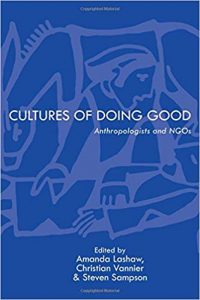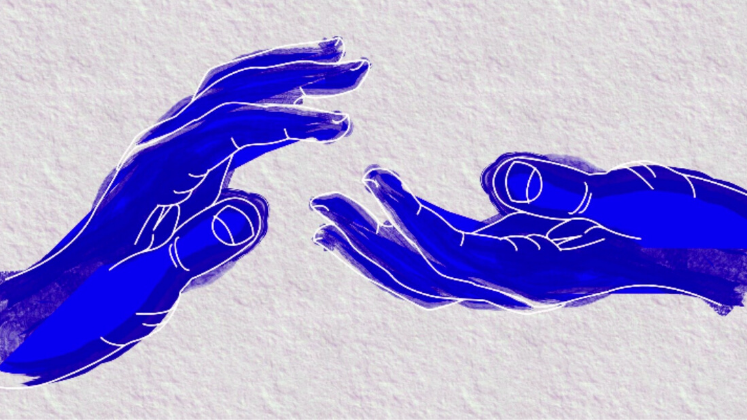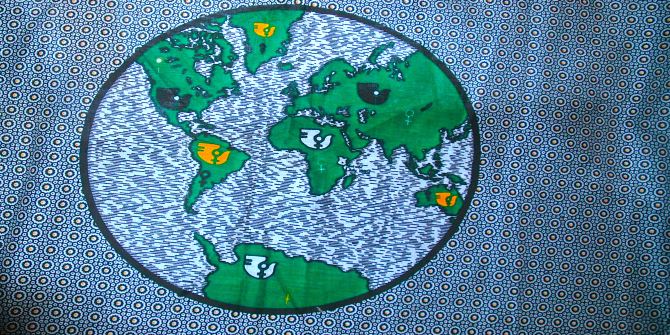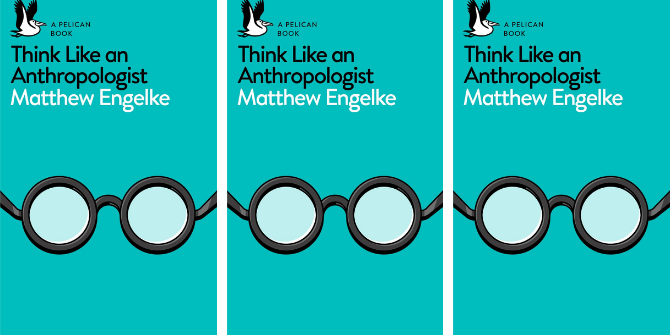In Cultures of Doing Good: Anthropologists and NGOs, editors Amanda Lashaw, Christian Vannier and Steven Sampson bring together contributors to advance the growing field of NGO anthropology. Written by anthropologists with intimate knowledge of NGOs in different contexts, the chapters offer rich and profound ethnographic analysis that examines the world of NGOs without neglecting their contexts and histories of action. This collection is required reading not only for those interested in NGOs and development, but also for those seeking a renewed and fruitful look at longstanding issues in anthropology, writes Natalia Castelnuovo Biraben.
Cultures of Doing Good: Anthropologists and NGOs. Amanda Lashaw, Christian Vannier and Steven Sampson (eds). University of Alabama Press. 2017.
 Find this book (affiliate link):
Find this book (affiliate link): ![]()
In addition to being an exhaustive and valuable compilation of studies, Cultures of Doing Good: Anthropologists and NGOs, edited by Amanda Lashaw, Christian Vannier and Steven Sampson, is also the first book of the series ‘NGOgraphies: Ethnographic Reflections on NGOs’. The launch of this series confirms the consolidation of a field of research: the Anthropology of NGOs.
Undeniably, the emergence of this field can only be understood within the programme of structural adjustment and neoliberal policies implemented in the ‘Global South’ at the onset of the 1970s and through the 1980s, which mainly resulted in the decrease of state-sponsored welfare, in parallel to the emergence of an almost unquestioning belief in NGOs as suitable and flexible agents of democratisation and service provision. From then on, NGOs have become increasingly involved in development, leading to the so-called ‘NGO boom’ of the 1990s and to what Victoria Bernal dubs ‘NGO fever’ in this collection (2017), referring to their initial explosion and their later expansion up until the early 2000s.
Anthropological studies of NGOs are, in turn, based on another field of research, that of development, and they are circumscribed by what contributor David Lewis calls ‘Aidnography’, which includes the analysis of the organisational practice and lifeworlds of NGO workers, as well as the structures and processes of the neoliberal architecture of the aid system. As Lewis appropriately points out, studying the ethnography of aid involves shifting attention away from those who are ‘developing’ to the ‘developers’ themselves. The plethora of NGOs in the 1990s provided anthropologists not only with a research topic, but also with a field of intervention that, in many cases, brought along their own involvement. This complicated the relationship while fostering deeper reflection on the researcher’s role and ethics.
The ethnographic studies compiled in Cultures of Doing Good refer to different contexts and geographies: Serbia, Tanzania, the Czech Republic, Egypt, Peru and the United States (New Orleans). These analyses, however, all share a series of premises. To begin with, they understand ‘NGO’ as a problematic category that encompasses organisations with divergent traditions, aims, interests and positions. Thus, it is deemed necessary to be wary of any a priori definition based on compartmentalised categorisation or on normative and prescriptive assumptions. Along this line, several contributors agree on the lack of consensus regarding how to conceptualise the role of NGOs, sharing the notion that it is a category without a clear definition and that therein lies its power. The ‘NGO form’ (Bernal and Inderpal Grewal 2014) is presented as unified, globally legible and serves as an umbrella under which highly diverse projects, policies and organisational structures can coexist, in addition to being a legitimate form of organisation for requesting and securing funds.
In fact, sticking to a literal definition of NGOs as non-governmental organisations overlooks the fact that many are deeply intertwined with states, and that frequently the borders between states and NGOs are ‘porous’ (a number obtain their basic funding from states) (Natalia Castelnuovo 2013; Lewis 2011). This brings us back to Evelina Dagnino (2011), who highlights that ‘civil society and the state are always mutually constitutive’ and that their relationship is a key dimension in the construction of democracy (124). In relation to the proximity of NGOs to states, some studies stress not only their inherently ambiguous character, but also that they are often considered ‘parallel states, as the glue of globalization, as translators and as intermediaries that create and sustain translocal and transnational circuits’ (Arjun Appadurai 2002; Erica Bornstein 2003; Analiese M. Richard 2009; Mark Schuller 2009, Millie Thayer 2010, in Bernal 2017: 38). All these observations are significant in that they call for an analytical focus on NGO practice and action, on how these actions serve to justify their existence, access to funds and their use and on the complex dynamics, relationships and negotiations between diverse actors in changing political contexts.

A second conceptual and analytical node that underlies these ethnographic studies refers to the moral character of NGO engagement and how it is expressed, as well as the meanings different actors attach to it. Sampson’s contribution argues that ‘entanglement’ is a consequence of engagement. In their search for securing resources and maintaining moral legitimacy, NGOs become entangled with other actors and institutions. This can facilitate or undermine their own projects. Bernal analyses how the entanglement of NGOs and donor agencies shapes contradictory and tense negotiations as well as hierarchical relations. In these contexts, not only funding is at stake; there is also a dispute linked to the disciplining power of donors that might change what NGOs do, how they document it and the language they speak (23). Bernal points to an international donor regime with clear effects, which governs the NGO landscape in ways that can stimulate or constrain their activities by not only imposing an agenda, but also by establishing priorities that alter their dynamics and the context of their activities.
If development is ‘a moral mission, seeking to improve the quality of life for people in other societies’ (Sampson, 5), NGOs are also part of that project (or civilising crusade), backed by interventions that grant legitimacy to the art of governing behaviour and shaping subjectivities. Their project of humanity improvement – a different version of what Tania Murray Li (2007) called ‘the will to improve’ (2007) – is part of the moral language that connects diverse groups and individuals to NGOs. Far from attempting to distinguish between ‘good’ and ‘bad’ NGOs (assessing, for example, project results or identifying and differentiating good practices from bad ones), the research gathered here presents the world of NGOs as a world of ‘doing good’ (William Fisher 1997), which involves moralised practice that reveals itself in various forms. It is in the moral sphere of ‘doing good’ and helping ‘vulnerable groups’ through their advocacy, mobilisation or channelling of resources that NGOs support their moral stance.
Although the chapters do not delve into the historical processes that determined civil society (and continue to do so) in the post-colonial world, the ‘civilising mission’ of the fifteenth and twentieth centuries served as justification for the intervention upon peoples and geographies, as well as for their colonisation, and aimed to expand and dominate through a European (mainly British, French, Portuguese and Spanish) model of administration and civilisation.
Certain aspects of this civilising project are still in force today and permeate the moral mission of development. They are sustained on ideas, practices and representations that range from the salvation and rescue of groups, to their representation through lack, problems and needs or through images of population lacking alternatives and freedom of action. Development usually exploits the image of passive, poor, ignorant people, usually people of colour, waiting for a white Western hand to rescue them (Chandra Talpade Mohanty 1991). As observed by Nicholas Thomas (1994), representations are authorised ways of constructing subjects, their possible actions and historic roles, and according to Mohanty, they should be considered part of the ‘colonialist move’ (1991), because they involve specific constructions of the ‘colonial’, ‘third-world’ and/or ‘underdeveloped’ subject and serve to legitimise the exercise of power upon this subject as well as the dominant idea of Western superiority.
Bernal points to a reconfiguration of Global North-South power relations and to a new type of political order, where ‘human rights’ (gender equity, the rule of law, transparency, etc) serve the North as a means to exercise surveillance and intervention across national borders (55). Nermeen Mouftah’s chapter makes a significant contribution in this line of research on what ‘doing good’ means for NGOs. The author explores how notions of ‘doing good’ intersect with the NGO form, shaping religious emergent practices against a backdrop of geopolitics and national politics. Mouftah suggests analysing the NGO as a site that draws on religion to motivate and mould development initiatives and, fundamentally, as a key locus for defining, delimiting and disciplining religion in public life and building new forms of religious practice, in this case specifically for reimagining Islam.
A third aspect that underlies these ethnographic studies in different ways refers to understanding NGOs, on the one hand, as a lens or ‘portal’ for examining and reflecting on broader topics, and on the other, as a site for reflection about ethical-methodological dimensions that stem from anthropologists’ involvement with NGOs. Looking through NGOs has become a privileged path for analysing connections between the global and the local, examining the forms taken on by neoliberal restructuring and the nature of development.
Moreover, certain scholars have stated that since 1980 and with more emphasis over the 1990s, states began perceiving NGOs as flexible tools for maintaining or extending their power (Fisher 1997) or as part of ‘an emerging system of transnational governmentality’ where states outsource their functions through these organisations (James Ferguson and Akhil Gupta 2002: 990). Thus, NGOs increasingly became an interesting lens for reflecting on their role as vehicles of neoliberal policies, as well as examining their responses to the impact of globalisation in local populations and in national processes.
As for the ethical-methodological debates that stem from the involvement (or not) of anthropologists in NGOs, the authors develop different positions, while still acknowledging the substantial role NGOs play as ‘navigational tools during fieldwork’, in that they ‘may operate as connectors, as partners for engagement, and as helpful “mirrors” of the potentials and contradictions of anthropological work’ (Lewis, 33-34). As pointed out in the volume, the proximity of anthropologists to NGOs creates liaisons while generating a series of difficulties: NGO activists and anthropologists share social worlds, artefacts and bureaucratic practices that might lead the latter to neglect a critical stance and adopt the NGO’s perspectives as their own. Thus, while researchers, such as contributor Katherine Lemons, deem it necessary to remain uninvolved in NGOs that usually attempt to ‘co-opt anthropologists’, Amanda Woomer’s chapter argues, like others, for an ‘activist engagement’, which entails involvement, shifting away from critique and moving into action.
From the perspective of activist engagement, working in an NGO is not only essential to carry out this type of research, but also the only possible path to effect change, ‘to blur the lines between academic and activist, researcher and volunteer’ (Woomer, 188). Both perspectives are political; neither is neutral. They invite us to reflect on the intermediary position of NGOs, which act as brokers, interpreters and translators (David Lewis and David Mosse 2006), not only for beneficiary communities and states, but also for anthropologists. As Bornstein points out, ‘working on behalf of others, NGOs depict themselves as representing others, much like anthropologists do’ (183).
This collection is required reading not only for those interested in the world of NGOs, but also those working in the field of development studies in particular and anthropology in general. Written by anthropologists with intimate knowledge and experience of NGOs in different contexts, the chapters offer rich and profound ethnographic analysis of the different edges of the Anthropology of NGOs, examining the world of NGOs without neglecting their contexts and histories of action. This volume is of immeasurable value not only because the authors’ perspectives shift away from the widespread normative and prescriptive approach to NGOs in the literature, but also because it presents a renewed and fruitful look at the long-established problems of anthropology, such as globalisation, modernity, development, state-civil society, power configurations and North-South domination.
Note: This review gives the views of the author, and not the position of the LSE Review of Books blog, or of the London School of Economics. The LSE RB blog may receive a small commission if you choose to make a purchase through the above Amazon affiliate link. This is entirely independent of the coverage of the book on LSE Review of Books.
Image Credit: Pixabay CC0.







